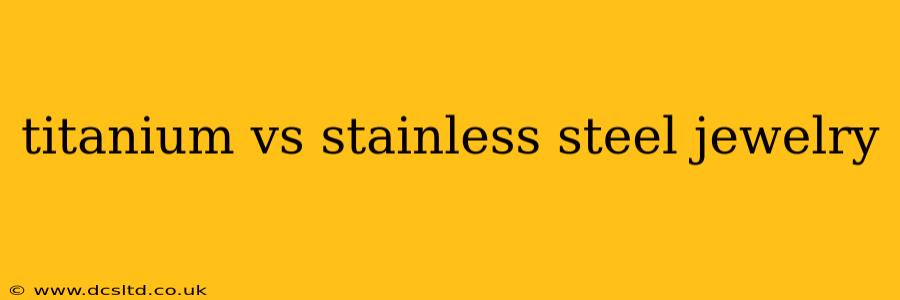Choosing the right metal for your jewelry can be a daunting task, especially with so many options available. Two popular choices often top the list: titanium and stainless steel. Both are durable and relatively affordable, but they possess distinct characteristics that make them suitable for different preferences and needs. This comprehensive guide will delve into the key differences between titanium and stainless steel jewelry, helping you make an informed decision.
What is Titanium Jewelry?
Titanium is a strong, lightweight transition metal known for its exceptional durability and hypoallergenic properties. Its high strength-to-weight ratio makes it ideal for jewelry that needs to withstand daily wear and tear without feeling cumbersome. Titanium's biocompatibility also makes it a popular choice for individuals with sensitive skin or metal allergies. It's naturally resistant to corrosion and tarnishing, meaning your titanium jewelry will retain its luster for years to come. However, its hardness can make it slightly more challenging to work with, potentially resulting in higher production costs.
What is Stainless Steel Jewelry?
Stainless steel is a family of iron-based alloys known for their resistance to rust and corrosion. Different grades of stainless steel exist, each offering varying levels of strength and durability. Commonly used in jewelry, 316L stainless steel is particularly known for its hypoallergenic qualities and resistance to tarnishing. It's generally less expensive than titanium, making it a more budget-friendly option. While durable, stainless steel is heavier than titanium and may be prone to scratching over time.
Titanium vs. Stainless Steel: A Head-to-Head Comparison
Let's break down the key differences between these two popular metals to help you decide which is right for you.
Durability and Strength:
- Titanium: Boasts exceptional strength and durability, even lighter than stainless steel. It's highly resistant to scratching and bending.
- Stainless Steel: Offers good durability, but it's generally less resistant to scratching than titanium. Its weight can be a factor for some individuals.
Weight:
- Titanium: Significantly lighter than stainless steel, making it comfortable for everyday wear.
- Stainless Steel: Heavier than titanium, which might be noticeable, especially in larger pieces of jewelry.
Allergic Reactions:
- Titanium: Highly biocompatible and hypoallergenic, suitable for individuals with sensitive skin or metal allergies.
- Stainless Steel (316L): Also generally considered hypoallergenic, but some individuals may experience minor reactions.
Cost:
- Titanium: Typically more expensive than stainless steel due to its processing and manufacturing complexities.
- Stainless Steel: Generally more affordable, making it a budget-friendly option.
Appearance:
- Titanium: Often has a sleek, modern look with a slightly darker, grayish tone. It can be treated with various finishes to achieve different colors.
- Stainless Steel: Typically has a shiny, silvery appearance, though it can be treated for different finishes.
Maintenance:
- Titanium: Requires minimal maintenance; simply clean with warm water and mild soap.
- Stainless Steel: Requires minimal maintenance; cleaning with warm water and mild soap is usually sufficient.
What is the best metal for jewelry?
The "best" metal depends entirely on individual preferences and priorities. Consider these factors:
- Budget: Stainless steel offers a more budget-friendly option.
- Weight preference: Titanium's lightness is a significant advantage for some.
- Allergy concerns: Both are generally hypoallergenic, but titanium is often preferred for extreme sensitivities.
- Desired aesthetic: Consider the distinct looks of each metal.
How do I clean my titanium or stainless steel jewelry?
Cleaning your titanium or stainless steel jewelry is simple. Use warm water and a mild soap, gently scrubbing with a soft cloth. Avoid harsh chemicals and abrasive cleaners.
Which metal is better for everyday wear?
Both are suitable for everyday wear, but titanium's lightness might make it more comfortable for extended periods.
Is stainless steel jewelry durable?
Stainless steel jewelry is durable, offering good resistance to scratching and tarnishing, especially 316L grade. However, it's less durable than titanium.
Are titanium and stainless steel jewelry hypoallergenic?
Both are generally hypoallergenic, but titanium is often preferred for individuals with severe metal allergies.
Ultimately, the choice between titanium and stainless steel jewelry comes down to your personal needs and priorities. Weighing the factors discussed above will guide you towards the perfect metal for your next stunning piece of jewelry.
